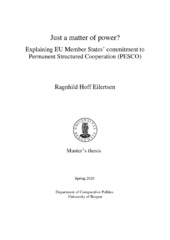Just a matter of power? Explaining EU Member States’ commitment to Permanent Structured Cooperation (PESCO)
Master thesis
Permanent lenke
https://hdl.handle.net/1956/23908Utgivelsesdato
2020-08-28Metadata
Vis full innførselSamlinger
Sammendrag
The EU Member States have generally been reluctant towards a common European security and defence policy, and previous attempts of such inter-state cooperation have been perceived as unsuccessful. Yet, the new European security and defence cooperation have raised high expectations. Implemented in 2017, Permanent Structured Cooperation (PESCO) is a framework for structural integration in the field of security and defence within the EU Common Security and Defence Policy. The aim is to develop defence capabilities and deepen defence cooperation amongst the Member States. Although it is expected to be a “game changer” in the field of security and defence, little research has been devoted to PESCO. With its project-based institutional structure, PESCO enables EU Member States to participate based on their level of ambition. As Member States’ commitment is key for the success of PESCO, research on this is crucial. This thesis contributes with a theoretical and empirical understanding of Member States’ commitment to PESCO. Theoretically, this was pursued by applying three well-known theories within international relations, namely realism, liberalism and constructivism. Empirical contributions were made by utilising data from the Council of the European Union (2019) to measure the Member States’ commitment to PESCO as well as to investigate determinants that possibly could explain these commitments. Scatter plots, negative binomial regression and multilevel logistic regression examine the variation in the Member States’ commitment to PESCO. The findings confirm that the Member States have different levels of commitment. The analyses imply that commitment seems to be a matter of military power, in line with the realist theory.
